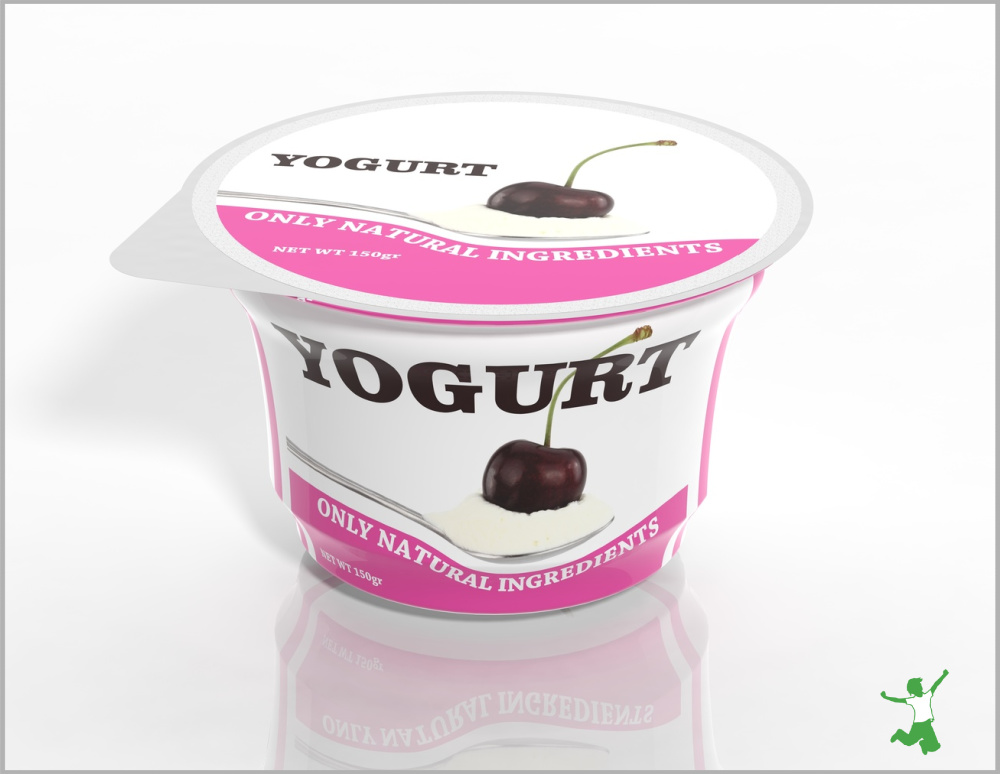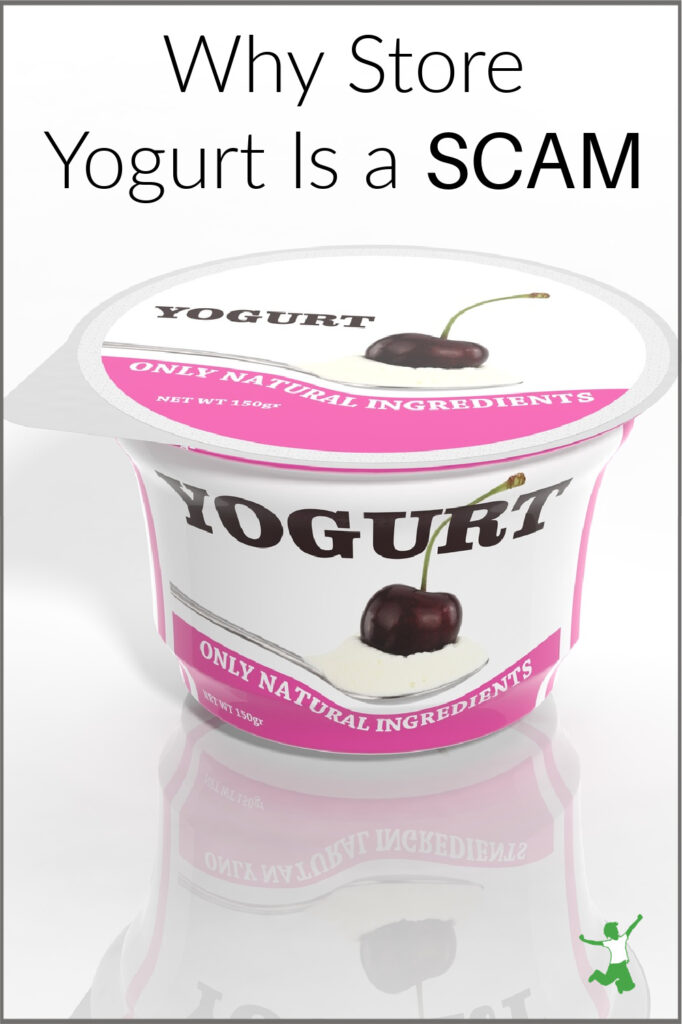The reasons why it is usually a waste of money to buy yogurt at the grocery store, the very few brands that are legit, and the best approach for enjoying yogurt that is truly probiotically active without breaking the bank.

As I was standing in line at the grocery store the other day, I noticed an older lady in front of me had an entire cart loaded with commercial yogurt.
I immediately felt very empathetic as she obviously was placing high importance on store yogurt in her diet. Perhaps she was attempting to help some sort of chronic digestive issue caused by the typical overmedicating of people her age.
What is really sad is that it is virtually certain that she was experiencing little to no benefit from her efforts and money spent.
This is because standard store yogurt, including those squeezable yogurt tubes for kids, is not the probiotically beneficial food that TV commercials and other compelling advertisements would lead you to believe.
The truth is that commercial yogurt is fermented for very short periods of time.
This includes highly popular Greek yogurt alternatives.
Improper Fermentation
The length of fermentation for commercial yogurt brands is so short (one person in the dairy industry told me that it is an hour or even less) that thickening agents are commonly added to give it the look and feel of real yogurt.
This is why Dr. Natasha Campbell-McBride MD, author of Gut and Psychology Syndrome, recommends avoiding commercial yogurt.
Instead, she recommends making yogurt at home and fermenting it for a full 24 hours to achieve maximum gut healing benefits.
The Specific Carbohydrate (SCD) Diet also recommends yogurt that is cultured for a full 24 hours.
Milk Sugars (Lactose) Still Present
Another problem that occurs by cutting corners at the factory is that commercial yogurt still contains plenty of lactose, as there was insufficient time for it to be completely consumed by the beneficial microbes.
Lactose is a disaccharide sugar, which is very difficult to digest for anyone with a digestive disorder.
Raw milk and raw yogurt contain lactase, the enzyme for digesting lactose, but pasteurized and homogenized store brands do not even if they are organically certified (heat destroys the enzyme lactase).
Thus, consuming commercial yogurt can often trigger autoimmune symptoms until steps are taken to heal and seal the gut wall so that it is no longer permeable.
In short, not only will store yogurt NOT help heal the gut, it can potentially make the situation WORSE.
GMO Sweeteners
Another problem with commercial yogurt is that sweetened versions often are of GMO origin.
Even health-savvy shoppers often don’t realize that if the label on commercial yogurt says “sugar”, it is virtually certain that sugar is also from a GMO source (beet sugar).
Only if the label says “cane sugar” or “organic sugar” does this guarantee that the sugar is GMO-free.
Other Considerations
Of course, making yogurt at home permits the selection of high-quality milk and avoidance of all the additives and sugar added to most commercial versions.
Yogurt fermented for 24 hours will most definitely assist your gut with the help of beneficial (though transitory) cultures that good quality yogurt is loaded with.
It is also helpful to note that yogurt made with raw milk will be naturally more drinkable-style like kefir than yogurt made with heated or pasteurized milk.
Cannot Make Yogurt Yourself?
The best policy when it comes to yogurt is to always make it yourself or buy it from a small farm that uses quality grass-fed milk (preferably raw) and ferments it properly.
You don’t need a yogurt maker! I make raw yogurt using a slow cooker. You can even make yogurt using your microwave (turned off, of course!) or oven as a low-temperature incubator.
If you must buy commercial yogurt when traveling, be sure to seek out one of the only two brands of 24-hour yogurt I’ve found that are commercially available (White Mountain and St. Benoit).
If you’ve come across any others, please add them in the comment section!
My online shopping hack will help you find these brands very quickly even if you are unfamiliar with the area you are visiting.









What about store bought Greek yogurt?
My son is addicted to go-gurts and packs one in his lunch everyday. I know it’s not as good as homemade yogurt (which he loathes and refuses to eat), but I tell myself “it’s better than nothing.” :-/
Kati ~
I don’t think it’s better than nothing. Nothing won’t kill you and he’ll eventually eat something else
.
You could take some whole fat, plain yogurt like Cabot’s Greek Yogurt, or the Brown Cow’s Cream Top yogurt and put it into single serve tubs with some honey and dried fruit or fresh fruit, or jelly/jam sweetened with fruit juice if you can find that. Or maybe freezing it though I’m not sure if that kills any enzymes or other parts of the benefit of yogurt. Feeding your child a low fat, sugared, food dye ridden snack is definitely not better than nothing. I know your heart is in the right place, you’re surely concerned for your child’s health and love him. Do some extra research on nutrition through the Weston A. Price Foundation or other sites that offer tips on traditional, whole, real foods and nutrition. It’ll change your life, I promise!
This may be an option, you did say he doesn’t like homemade, but I am looking into a silicone reusable squeeze tube that you could fill with yogurt at least in bulk and maybe find a better kind that he would tolerate. Just a thought.
Here is one of the options I’m looking into…
Store food won’t do squat for your health 🙂
I love to make my yogurt from my homemade kefir. I don’t need to subject the raw milk to any heat (which destroys all those great enzymes) and it’s loaded with great probiotics. It’s funny, because there are times that I let my kefir ferment for too long and it begins to separate the milk fat from the whey. So I just let it sit out longer to fully separate. I then strain it until the “curd” is a yogurt consistency and then I have the whey leftover to use for homemade beet kvass, sauerkraut or to use when I soak grains or legumes. It’s a win-win situation!
Oh, and Sarah, I love to talk to people in the grocery line. I’ve told people about lots of good things they should try. Sometimes I’ll even ask someone about a unique item they have in their cart that I haven’t tried yet. I’ve even shared phone numbers with one lady so I could share with her my kefir grains.
We all hate that sometimes long wait in the grocery line, so why not make it fun?
Shari
This is the same way I make my homemade yogurt, which I stumbled upon quite by accident several years ago. I wanted to make yogurt without heating my raw milk AT ALL, so I kept experimenting until I got what I was looking for in taste and texture. Heating the milk and killing off even a few of they beneficial enzymes just didn’t make sense to me. Glad to hear of someone else who managed to make it work, too!
D or Shari, could you please elaborate on your process of making yogurt from homemade kefir? 🙂
Oh, this sounds like a great option since we make tons of kefir and often need whey!
Do you have any problems with your yogurt getting too separated with long yogurt-making times? My yogurt maker recommends 8 hours; when I’ve gone much longer than that, the yogurt separates into curds and whey.
Your yogurt probably got too hot. Some yogurt makers build up heat and if you go too long they will kill the culture and curdle the milk.
I have a yogourmet that I make my yogurt in. Does the 24 hours START once it goes in there??
His,
Shari
24 hours once you add the culture.
What about goat milk yogurt? I think Redwood Hill Farm yogurt is made in small batches. Have you ever eaten goat’s milk yogurt?
If you are not sure … call the farm and ask directly. How long do they let the yogurt ferment?
I am not sure on that, but my friend did visit their farm and their vanilla flavor is made from pressing the vanilla beans until liquid is all pressed out. My corn-allergic son does very well on it. It is *very* expensive though!
Kristina, I realize I’m commenting a year later, but I have met very few people who share my corn allergy! I have never had trouble with Stoney Field Farms, Brown Cow, or Aussie yogurts. To be fair, however, I’ve had to avoid dairy for the last year and I haven’t paid attention to those brands since then.
Perfect timing with this post! I am almost finised with my first batch of homemade yogurt right now….but I am wondering if it didn’t sit long enough either. 3 hrs cooking milk, 3 hours for it to stand, and then 12 hours with the yogurt culture in it.
I too, was shocked, when I finally woke up and read the ingredient label on the store bought yogurt – YUK!
Store Yogurt Won’t Do Squat for Your Health http://t.co/ow0eqdcs http://bc.vc/TpGmY
Great post! I’m going to share this with my clients. Did you enlighten the woman?
No I didn’t say anything. The grocery store checkout line is not a great place place to start a conversation about the dirty secrets of the food processing industry! LOL